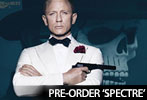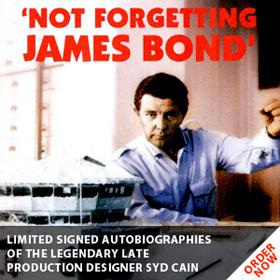Charlie Higson talks about his new horror trilogy |
Young Bond - 06-06-10
In Charlie Higson's latest book, grown-ups turn into zombies and terrified children run the gauntlet. The unlikely author tells Tim Elliott of the Sydney Morning Herald it is scarier when horror is set in real life.All of you anxiously awaiting the flu season should approach The Enemy with extreme caution � and perhaps a pair of gloves. The latest novel from English author Charlie Higson, it tells of a world ravaged by "the sickness", a cross between swine flu and bubonic plague, a virulent and highly contagious illness that turns its victims into flesh-eating zombies. Oddly enough, however, only adults can catch it. Higson's London is a wrecked, post-apocalypse city of trashed supermarkets and burnt-out homes, where terrified children fight off tribes of pus-oozing adults.
"The central characters in my book are a bunch of kids who have holed up in a Waitrose [supermarket]," says Higson, who attended last month's Sydney Writers' Festival. "But food is running out. One day they meet another group of kids who tell them that there is a safer place to live. And so they begin this quest through London, through deserted houses and down alleyways, fighting for survival all the way."
The first in a new series, dubbed Fourteen, The Enemy is aimed at young adults, but the sparseness of the prose, its pace and unsentimental tone make it equally rewarding for older readers. Perhaps best of all is the sheer creepiness of the conceit, the idea that those who had previously loved and cared for you � police, politicians, your own parents � now want nothing more than to eat your brains.
"I like my horror close to home," Higson says, laughing. "I like the idea that it's your mother or your father that has turned into a zombie and is trying to kill you. And I tried to set it in as real a world as possible. It's scarier that way."
Self-effacing and dryly humorous, the 51-year-old Higson is hardly your average horror writer. Best known for his Young Bond series, which has now sold more than 1 million copies and been translated into 24 languages, Higson has had an oddball career, at various points touring with an indie funk band, painting houses and doing comedy TV. "It's been a strange career path," he concedes. "None of it was planned."
Educated at the 600-year-old Sevenoaks School in Kent, Higson studied gothic literature at the University of East Anglia, where he met a musician named Paul Whitehouse. With Whitehouse and two other university mates, Higson formed a band, called the Higsons, a Talking Heads-style outfit that toured Britain, as well as going around America three times between 1980 and 1986. "We never made any money," he says. "And so in between gigs Paul and I would paint houses. London has a lot of houses so you never run out of work."
After the band broke up, Higson was contacted by old friend and comic Harry Enfield, whose character Stavros was booked for Saturday Night Live. Enfield asked Higson and Whitehouse to write for him, kick-starting the first in a long line of comedy projects that included The Smell of Reeves and Mortimer, Randall and Hopkirk (Deceased) and the BBC sketch show The Fast Show (1994-2000), in which Higson also starred.
But his real passion was novels. "I'd been writing ever since I was 11," he says. "In my teenage years I wrote fantasy and science fiction and then at uni I started writing impenetrable student stuff, a mix of magic realism with William Burroughs-style cut-up technique. I would write fake thriller genre stuff and mix it into the magic realism. But then I realised that I quite liked writing the genre stuff, so I thought, why don't I just do that?"
His first novel, King of the Ants (1992), was what he describes as "a hard-boiled, straight-down-the-line thriller" set in London, about a painter who gets involved with some dodgy builders. "It was quite violent," he chirps. "Everyone ends up dead."
This was followed by Happy Now (1993), Full Whack (1995), and Getting Rid of Mister Kitchen (1996), grimly humorous dystopian thrillers that led Time Out to describe Higson as "the missing link between Dick Emery and Bret Easton Ellis". Among the novels' other admirers was the Ian Fleming estate, which controlled the James Bond franchise. In 2003, the estate contacted Higson to ask if he would be interested in writing a series of books aimed at young readers telling the story of Bond as a young boy. "I am a lifelong Bond fan," Higson says. "I had also read all of the Fleming books in my 20s, so of course I said yes. I mean, it was a dream job."
The books would be set at Eton College, the alma mater of the fictional Bond and his creator, Ian Fleming, who went there in the 1920s. According to Higson, Eton remains proud of its association with Bond. The school's then senior librarian, Michael Meredith, had created an extensive Fleming archive and was only too pleased to help with research and fact-checking.
But what he couldn't help was the reaction of rusted-on Bond fans. "They hated it!" Higson says. "When it was announced, in 2004, that a TV comedian was writing about Bond at school, people went, 'What the f--- is the Fleming estate thinking?!' The last thing they wanted was a Harry Potter version of Bond � Bond doing his homework, Bond getting detention. They didn't want to see Bond as a boy, because he was supposed to be the ultimate man."
But Higson did not do a Harry Potter: he made the young Bond books � of which there are five � genuine thrillers, full of action, light on adverbs and notably absent of gags. "Even though I have written comedy before I have never been a fan of comedy books: I have never found them funny.
"So with Young Bond I kept it very much in the style of Fleming, which was to make Bond quite dark and serious."
"Dark and serious" could indeed pass as Higson's writing ethos. Well, maybe "dark, serious and gruesome". Horror, particularly George A. Romero's zombie films, has always been one of Higson's primary influences: at university he did a film course on horror, as well as writing a dissertation on director David Cronenberg, whose films include Scanners (1981) and The Fly (1986).
"The '70s was the golden age of horror," he enthuses. "Before Spielberg came along it was all trashy low-budget films with actors you'd never seen before and directors you didn't know, and watching these films you'd think anything could happen! Any of these people could die � I don't know who they are.
"And often you would think, wow, this film has been made by really sick people. It gave it this gritty edgy. It was much more suspenseful, too, because you honestly didn't know what was going to happen."
In The Enemy, Higson wanted to give his readers the same kind of "visceral kick that I got from those horror films in the 1970s".
The Fourteen series is also part of Higson's wider mission to write the kind of books that boys might actually want to read. "In the 1980s, there was a big swing against violent stories for boys. It was seen as politically incorrect to have villains carrying guns and people killing people. Instead, they wrote worthy books. As a result, a whole generation of boys stopped reading."
That's unlikely to happen to Higson's fans. "Most of the young adult stuff I write I give to my teenage sons to read. Luckily they've liked most of it. But they always have one piece of advice: 'Kill more people! More action, less talk!' "
A formula for success if ever there was one.
 Discuss this news here...
Discuss this news here...



